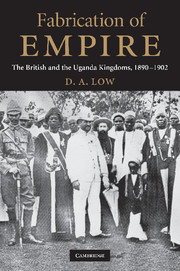Book contents
- Frontmatter
- Contents
- Preface
- List of abbreviations and locations
- Sketch maps
- 1 Prologue: survey and agenda
- 2 Statecraft: external intrusion and local dominion
- 3 Ferment: conversion and revolution in Buganda
- 4 Upcountry: might-have-beens and the Buganda/Uganda outcome
- 5 Warbands: new military formations and ground level imperialism
- 6 Paramountcy: Toro, Busoga and the new overlords
- 7 Defeat: Kabalega's resistance, Mwanga's revolt and the Sudanese mutiny
- 8 Succession: Nkore and the war of Igumira's eye
- 9 Dénouement: aggregations and rulerships
- 10 Government: colonial settlements and the Buganda model
- 11 Capstone: honour, awe and imperialism
- 12 Round up and review
- Select bibliography
- Index
3 - Ferment: conversion and revolution in Buganda
Published online by Cambridge University Press: 04 July 2009
- Frontmatter
- Contents
- Preface
- List of abbreviations and locations
- Sketch maps
- 1 Prologue: survey and agenda
- 2 Statecraft: external intrusion and local dominion
- 3 Ferment: conversion and revolution in Buganda
- 4 Upcountry: might-have-beens and the Buganda/Uganda outcome
- 5 Warbands: new military formations and ground level imperialism
- 6 Paramountcy: Toro, Busoga and the new overlords
- 7 Defeat: Kabalega's resistance, Mwanga's revolt and the Sudanese mutiny
- 8 Succession: Nkore and the war of Igumira's eye
- 9 Dénouement: aggregations and rulerships
- 10 Government: colonial settlements and the Buganda model
- 11 Capstone: honour, awe and imperialism
- 12 Round up and review
- Select bibliography
- Index
Summary
The years 1888–93 were a tumultuous period in the history of Buganda. The eruptions emerged from the cauldron of competing aspirations which had scored the apex of Buganda society over the two preceding decades. The upshot here soon became interlocked with far wider events which eventuated in the global imperial power Britain imposing a quite new political framework upon Buganda and its neighbours, within which, as we must see, Buganda found itself quite fortuitously placed in the middle. That in turn became intertwined with the assertion of British imperial hegemony over the more salient operations of the Buganda kingdom and in due course those of its neighbours. Earlier it has been suggested that it was characteristic of many an encounter between an indigenous polity and an imperious colonial power that they passed through a ‘defining conjuncture’ and that this was heavily conditioned, not least at the outset, by ‘conditioning circumstances’ within the indigenous polity itself. It was also said that most strikingly these were shaped in Buganda by the major religio-political revolution that occurred there immediately prior to the British colonial advent. Its genesis has been frequently recounted before and can only be selectively reiterated here, since in the present context attention needs to be principally focused on the successive staging points in the sequence of events within Buganda in the years 1888 to 1893.
- Type
- Chapter
- Information
- Fabrication of EmpireThe British and the Uganda Kingdoms, 1890–1902, pp. 57 - 85Publisher: Cambridge University PressPrint publication year: 2009



